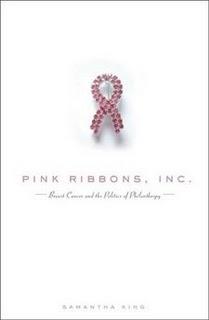Pink Ribbons, Inc.: Breast Cancer and the Politics of Philanthropy

Who hasn’t done it? Who hasn’t bought that extra cup of yogurt or that pink scarf that matches nothing in the closet just to show support for the breast cancer cause? Most women have seen what breast cancer can do in the lives of real women, whether we have endured it first-hand or watched a loved one struggle to survive. I have always felt that sweet inner glow after making a purchase if I knew that a small percentage of the proceeds would go to support breast cancer research. As a consumer, I felt that I was doing my part. I never questioned why my philanthropy needed to be tied directly to my consumerism. I never questioned it, that is, until I read Pink Ribbons, Inc.
What do big corporations and politicians have in common? According to Samantha King, an Associate Professor of Women’s Studies and Physical and Health Education, both groups have profited from our society’s fascination with breast cancer. King offers a searing discussion of the push toward “strategic philanthropy” in the last two decades of the 20th Century. With the current stress on cause-related marketing, corporations exploit the public’s civic goodwill as they fight “to gain ownership over the issue.”
According to King, politicians have not failed to cash in on the moral authority of the breast cancer cause. Many “women’s issues” are viewed as political landmines for legislators. Breast cancer, however, has proven to be a safe issue, allowing legislators to present themselves as “pro-woman” without the danger of being associated with the “F” word—Feminism.
King also focuses on the effect of the recent “tyranny of cheerfulness” surrounding the issue of breast cancer. Because society desires to see the results of its philanthropy, women are perhaps not allowed to acknowledge the flood of emotions that accompanies the diagnosis and the struggle against the disease. Our focus has shifted to the “survivor.” Anything less is unacceptable. In this struggle to find the cure, we have lost sight of the importance of prevention. Reading King’s analysis of the issue made me for the first time question who really benefits when I “think pink” at the cash register. Who really wins in what the_ New York Times_ termed “the battle for the breast?”